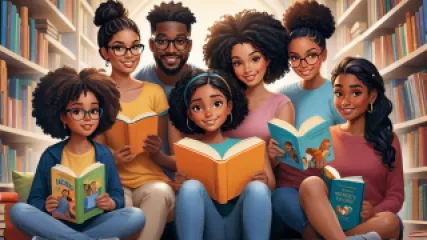Learning About Neurodiversity Through Fiction
Introduction
Neurodiversity is an important concept that recognizes and celebrates the natural variations in the human brain. It emphasizes that neurological differences, such as autism, ADHD, dyslexia, and other developmental conditions, are simply a part of the normal range of human diversity. By embracing neurodiversity, we can create a more inclusive society that values and supports individuals with diverse ways of thinking and experiencing the world.
One way to gain a deeper understanding of neurodiversity is through fiction. Books and movies have the power to transport us into the minds of characters who experience the world differently. They can provide valuable insights and help us develop empathy and compassion for those who think, learn, and communicate in unique ways. In this article, we will explore how we can learn about neurodiversity through fiction and apply those lessons to our own lives.
1. The Power of Representation
Fictional stories allow us to see ourselves and others in the characters we encounter. When neurodiverse characters are authentically portrayed in books and movies, it can have a powerful impact on individuals within the neurodiverse community. Seeing characters who share their experiences and challenges can provide a sense of validation and belonging.
For neurotypical individuals, encountering neurodiverse characters in fiction can broaden their understanding of different ways of being in the world. It can challenge stereotypes and misconceptions, fostering a more inclusive and accepting mindset.
"Representation matters. When we see ourselves reflected in the media we consume, it sends a powerful message that our experiences are valid and worthy of recognition," says Nyla Adams, a neurodiversity advocate.
2. Developing Empathy
Fictional stories have a unique ability to transport us into the lives of others. By immersing ourselves in the perspectives of neurodiverse characters, we can gain insights into their thoughts, feelings, and experiences. This immersive experience helps develop empathy and understanding.
When we witness the challenges and triumphs of neurodiverse characters, we begin to grasp the immense strength and resilience they possess. We learn to appreciate the unique perspectives and contributions they bring to the world.
Amari Foster, a psychologist specializing in neurodiversity, explains, "Fictional stories provide a window into the inner worlds of neurodiverse individuals. They allow us to step outside our own experiences and walk in someone else's shoes. This fosters empathy and helps break down barriers between neurodiverse and neurotypical individuals."
3. Challenging Stereotypes
Many fictional narratives perpetuate harmful stereotypes about neurodiverse individuals. However, there are also stories that challenge these misconceptions and present a more accurate depiction of neurodiversity.
By engaging with fiction that portrays neurodiverse characters as complex, multidimensional individuals, we can challenge preconceived notions and dismantle stereotypes. These stories remind us that neurodiverse individuals are not defined solely by their differences but have unique talents, strengths, and aspirations.
Curtis Carroll, an author and advocate for neurodiversity, emphasizes the importance of diverse narratives, saying, "We need stories that showcase the incredible diversity within the neurodiverse community. By sharing these stories, we can break free from the limitations of stereotypes and celebrate the richness of human experience."
4. Gaining New Perspectives
Fiction allows us to step out of our own experiences and gain new perspectives. Through the eyes of neurodiverse characters, we can explore different ways of perceiving and interacting with the world.
Neurodiverse characters often possess unique strengths and abilities that can inspire and challenge us to reconsider our own biases and assumptions. By immersing ourselves in their stories, we open ourselves up to new ways of thinking and being.
"When we engage with fiction that explores neurodiversity, we are given an opportunity to broaden our horizons and expand our understanding of what it means to be human," says Darrick Butler, a writer and advocate for inclusive storytelling.
5. Inspiring Change
Fiction has the power to inspire change both within individuals and society as a whole. By sharing stories that promote neurodiversity, we can foster a more accepting and inclusive culture.
When neurodiverse characters are portrayed as heroes, role models, and protagonists in their own stories, it sends a powerful message of empowerment. It encourages neurodiverse individuals to embrace their differences and pursue their dreams without fear of judgment or exclusion.
"The stories we consume shape our perceptions and beliefs. By supporting and promoting fiction that celebrates neurodiversity, we can create a cultural shift towards greater acceptance and understanding,"says Curtis Carroll.
Conclusion
Fiction provides a unique lens through which we can explore and understand neurodiversity. By engaging with stories that authentically portray neurodiverse characters, we can develop empathy, challenge stereotypes, gain new perspectives, and inspire positive change.
As we continue to learn about neurodiversity through fiction, let us remember the importance of diverse representation, accurate portrayals, and the power of storytelling to shape our perceptions and create a more inclusive society.
This article was written in collaboration with neurodiversity advocates Nyla Adams, Amari Foster, Curtis Carroll, and Darrick Butler.






